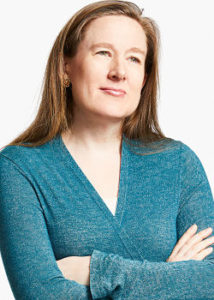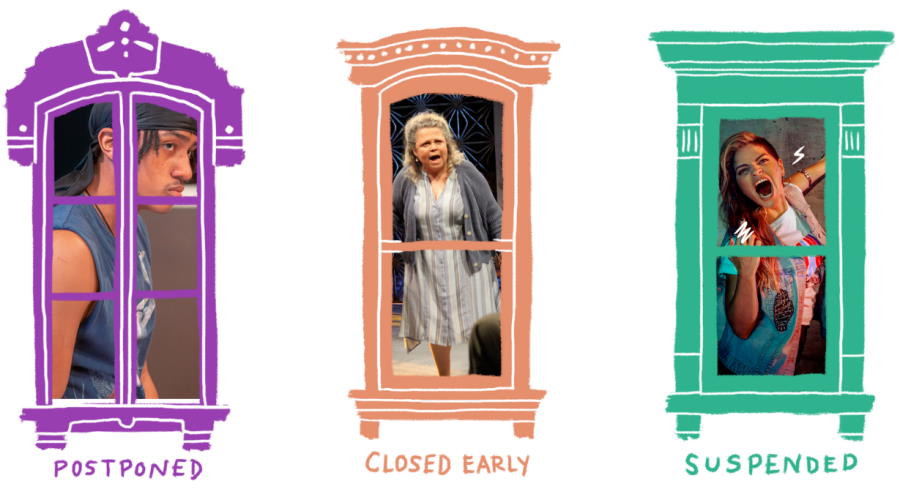What is the role of theatre criticism and journalism when there’s no theatre happening? It’s a question we’re actively and daily wrestling with here at American Theatre, as are editors and writers at theatre and culture desks everywhere.
But what if your theatre journalism venture hadn’t yet begun when the global pandemic shutdown took hold in March? The creators of 3Views on Theater, an online journal to be launched under the umbrella of gender-parity organizers the Lillys, originally aimed to diversify and broaden theatre criticism beyond the perspective of cisgender white men. But the coronavirus quarantine demanded a pivot, and pivot it has, to another of theatre journalism’s central missions: memorializing a fundamentally ephemeral art form. The 3Views website is now a venue to commemorate canceled or postponed productions, three at a time, with script excerpts, video samples, photos, and design sketches. They’re also publishing reflections from theatremakers on our current moment, as well as profiling emerging writers, composers, librettists, and lyricists whose work was cut short by COVID-19.
I recently spoke to Sarah Ruhl, co-founder of the site with Julia Jordan, and Melissa Crespo, a director who has taken the lead as editor of the site.
ROB WEINERT-KENDT: I’ve always been curious about 3Views, and I’m excited about this new iteration. It’s beautiful. I want to start by asking what you were up to when the lockdown began?

MELISSA CRESPO: I was in the middle of rehearsing a world premiere that Labyrinth and the Sol Project were producing together [Bees and Honey by Guadalís Del Carmen] when everything shut down. And I had all this time on my hands, so it became sort of a no-brainer for me to step in and charge forward with this new iteration of 3Views, which has actually been a lifeline in this whole whole madness.
SARAH RUHL: I was in the middle of—transferring is the wrong word, but I was about to be in rehearsal for a new production of Becky Nurse of Salem at Lincoln Center, which I had also done in Berkeley. This was a different incarnation. So all of us had suddenly free time on our hands.
So why the pivot to archiving productions?

SARAH: I think part of the idea to feature canceled productions in this way came from this notion that it’s historically unprecedented to have the entire theatre frozen in amber across the world. It also seemed incredibly tone-deaf to think about criticism right now when there’s no theatre to write about, and, in a practical sense, we thought, there’s not going to be funding for theatre criticism for a long time. The primary funding goals will need to be the survival of the artists, the survival of the houses. So first, you know, look for the coming back of theatre, and then way down the road, maybe someone will want to fund a journal for a new kind of theatre criticism. This felt like something we were equipped to do, to mourn and observe and take notice of the moment we found ourselves in.
Is it going to be national, not just New York productions?
MELISSA: Yes, it’s a big effort to cover all around the country, and maybe we can get to London or Dublin, theatres across the pond.
What’s the process of deciding which productions to focus on? Are you getting submissions, or editorially choosing or curating them?
MELISSA: It’s been a mixture of both. Before we launched, it was a lot of me looking at the list of everything that was running at the time or in rehearsal and reaching out and explaining what we’re doing. But now that we’re out, we’ve been getting a lot of people wanting to be a part of it, which is great and saves me a lot of email.
I notice that you’re including some photos and script excerpts. I always love to see design sketches and maquettes too. You’re obviously going to stop short of putting up videos of whole shows.
MELISSA: We’re giving a little taste. For some shows, like Dhaba on Devon Avenue, which only had a weekend of rehearsal when things got shut down, the pictures I have are of them in rehearsal. We also have an excerpt of the script and audio of an actor reading a monologue.
SARAH: I have been thinking of it in terms of talismans or artifacts—thinking of this as a slightly archaeological project. What tactile thing can we get our hands on? Melissa interviewed the soprano who was in the Intimate Apparel opera, and she sang a little for Melissa. Also, having excerpts of the plays is really important to me; I feel like there is this movement toward Zoom and toward digital content, but ultimately, during this time of pandemic, there’s also the impulse to go totally analog and to say, there’s this very old technology called the book that you can entertain yourself with and find solace in. For me, the excerpt of the play is a really good representation of what the production might’ve been.
MELISSA: I love your use of the word talisman. You’ve also been calling it a Zen rock garden, which has been another really great way to think of it.
SARAH: Yes, I think of the practice of putting stone in front of stone, connecting piece after piece, as just a way to keep going until the theatre reopens.
Do you hope to keep this going until theatres reopen, and if so, do you intend it to be a comprehensive list of canceled or postponed shows?
MELISSA: I know we’re not going to get every single production around the world or even the country, but it would be great if, when we go back, there were no orphans. Because I know that some theatres are going to close, or there’s going to be reasons these plays won’t get immediately produced again. But to be able to track them and go back and see who, what, and why—I hope we can create a home, a place where artistic directors can go and look through plays that were deemed worthy at one time, and see if we can help nudge them into a second life. That would be a wonderful thing.
I wonder if you both could talk about your plans outside 3Views, and your hopes and fears for the art form. Sarah, I loved and quoted something you wrote about how air is the “magical substance” that makes theatre “different from books or films” but “is what we fear right now.”
SARAH: Oh, the air. I’m missing it. I’m missing the air and the bodies and space together, and I can’t wait to get back to it. I guess my hope is that we come back with this renewed appreciation for the form itself. The fact that we all decide to gather at the same time in the same place has gone as unremarked upon for many years. You know, all we talk about is what stories are being told within the space. We don’t kind of go, “Oh my God, isn’t it amazing that we all got dressed, we all decided to leave our house, we risked our lives to come sit next to each other and watch other people who also are fully dressed and also are in the same time space continuum—like, isn’t that amazing?” I think that alone will be so moving. I just went to my first bookstore the other day on Rhode Island; they opened a bookstore and five people are allowed in at a time with masks and gloves. I browsed and I was so overjoyed. I just kind of wept—that I was handling a real book that a real human being had placed before me was moving to me. I think that’s how I’ll feel when I’m in rehearsal. I think, Oh, just to be in a rehearsal room with other people again.
As for my plans, I’m working on a book because prose feels easier to me right now, and little haikus to kind of mark the time. I find it hard to write a new play right now. I will be excited to get back to this play Becky Nurse of Salem when it happens.
How about you, Melissa?
MELISSA: It’s a really hard question; I had only directed opera in New York, so the Labyrinth play would have been my Off-Broadway debut directing a play, which is my first love. There are a lot of people, friends of mine, who are in similar positions. So much of my income is from traveling and doing theatre outside of New York; now I don’t know what that means. I have started to get requests to travel next year, which just is a surprise. And I’m being asked to do a lot of Zoom directing, so I’m learning to love it. I am very technologically savvy, but I’m going to have to be even more so.
Actually 3views has helped put things into perspective: It’s not just me, it’s all of us. It’s like, oh, okay, there are a lot of us, we’re going to figure this out. I don’t really have an answer as to what’s next. Working on 3Views has actually helped me live a little more in the present, which is surprisingly hard for me cause I’m a planner. I’m a Virgo.
SARAH: It’s hard for everyone to live in the present. And funnily enough, it’s kind of our practice as theatre beings, to live in the present. But in order to do that, we have all our rituals: We have our rehearsal room, we have each other, we have an invented reality. That’s how we force ourselves to look at the present together. So now we’re alone in our little domiciles trying not to plan, knowing that we can’t plan.
At one point when we were doing this pivot with 3Views and were soliciting material, we first were asking for reflections. And I was like, “You know, do you want to just write a prayer? A secular prayer for the world or for the theatre?” And it seemed like people were like: Oh yeah, I want to write a prayer. It made me realize that that’s sort of where a lot of people’s heads are at. Like it’s hard to think cognitively.
MELISSA: Yeah. That was definitely the one that Lynn Nottage responded to as well. She was like, “Well, what would I write? I have nothing to say.” And I was like, “How about a prayer? That’s what Julia Cho’s doing.” She was like, “Oh, I can do that.”


